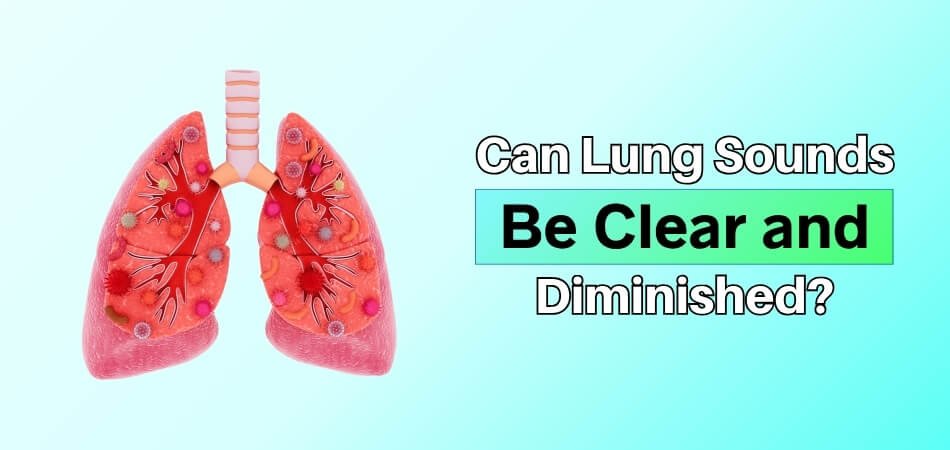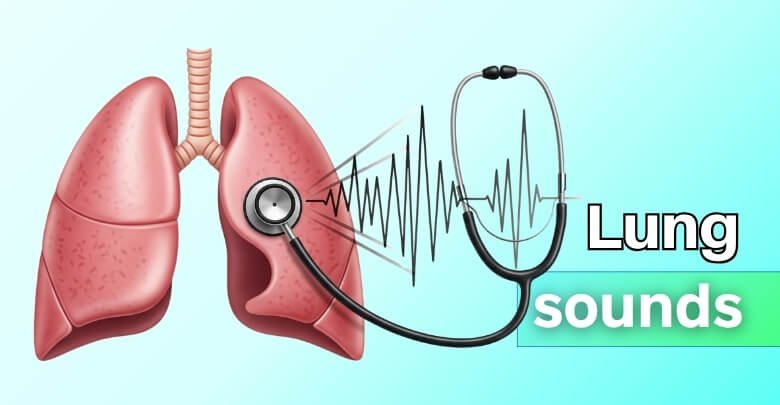Lung sounds tell doctors a lot about how well your lungs are working. When a doctor listens with a stethoscope, they check for any strange sounds like wheezing or crackling. Sometimes, lung sounds are called “clear,” which means no unusual noises. But at the same time, these sounds can be “diminished,” or quieter than normal. If you are concerned about whether can lung sounds be clear and diminished, then don’t.
Yes, it is possible to clear and diminish your lungs. Clear means no extra sounds, and diminished means the sounds are softer because the airflow is weak or the sound doesn’t travel well. This can happen in health problems like COPD or obesity.
Keep reading to find out more about what this means for your lungs.
Can Lung Sounds Be Clear and Diminished?
Yes, lung sounds can be clear and diminished at the same time. Clear lung sounds mean you don’t hear extra noises like wheezing or crackling. Diminished means the sounds are softer or quieter than usual when a doctor listens. This happens when the airflow is weak or the sounds don’t reach the stethoscope well.

Clear Lung Sounds
- “Clear” refers to the quality of the breath sounds: they are free from abnormal (adventitious) noises such as crackles, wheezes, rhonchi, or stridor.
- When lung sounds are clear, air is moving through the airways smoothly, and there is no evidence of fluid, mucus, or airway narrowing causing extra noises.
Diminished Lung Sounds
- “Diminished” refers to the intensity or volume of the breath sounds: they are quieter than normal.
- Diminished breath sounds can result from reduced airflow (as in shallow breathing, airway obstruction, COPD), increased chest wall thickness (as in obesity), or conditions that block sound transmission (like pleural effusion or pneumothorax).
The Ways Your Lungs Can Sound Be Both Clear and Diminished
Lung sounds give important clues about how well your lungs work. Sometimes, lung sounds can be clear but also softer or quieter than usual. This can happen for different reasons, and understanding them helps with better care.
Weak Airflow from Lung Conditions
Certain lung diseases make it harder for air to move freely inside your lungs. This lower airflow causes lung sounds to become softer than normal. However, you won’t hear extra noises like wheezing or crackling in these cases. This combination often shows in chronic lung problems.
Thick Chest Wall or Obesity
A thicker chest wall or extra body fat can block sound from reaching the stethoscope. This makes lung sounds quieter, even if the lungs themselves are healthy. You will still hear clear sounds because no extra noises occur. Doctors consider this when checking breath sounds.
Air or Fluid Between the Lung and the Chest Wall
Air or fluid trapped around the lungs can reduce sound transmission outside the lungs. This results in diminished lung sounds, while the actual lung sounds remain normal. Conditions like pneumothorax or pleural effusion cause this problem. It is important to spot these issues early.
Shallow Breathing or Weak Effort
If a person breathes very softly or does not take deep breaths, lung sounds may be clear but quiet. The weaker airflow lowers the sound intensity heard by the doctor. This can happen when someone is tired or in pain. It’s a simple reason for diminished but clear lung sounds.
Devices Helping Lung Function
Some devices, like OmniBreathe, assist in improving airflow during breathing exercises. These tools help patients breathe more deeply, which can make lung sounds clearer and louder. Using them regularly supports better lung health. This can reduce the chance of diminished lung sounds over time.
What Makes Your Lungs Make Sounds?
Lung sounds come from the air moving through your breathing passages. Different parts inside your lungs and throat work together to create these sounds. Knowing what causes these noises helps understand lung health.

Airflow from the Lungs
When you breathe out, air moves from your lungs through the windpipe and airways. This moving air is the main source of lung sounds that doctors listen for. Without airflow, there would be no lung sounds to hear at all. The strength of this airflow affects how loud the sounds become.
Vibration of Vocal Folds
Your voice box in your throat passes air when you speak or make sounds. This air makes the vocal cords vibrate, creating sounds you can use for talking. These vibrations turn into speech with the help of your mouth and nose. This process adds extra noises beyond normal lung sounds.
Airway Turbulence
As air flows through your lungs, it can create small vibrations when moving over narrow spots or mucus. This turbulence produces different sounds like wheezes or crackles, especially if airways are partly blocked. These noises help doctors find lung problems early. Turbulence changes the usual clear lung sounds.
Anatomical Structures’ Role
The shape and size of your trachea, bronchi, and smaller airways affect lung sounds a lot. Any mucus or blockages inside these passages change the sounds you hear. The voice box, or larynx, also adds its own unique sounds during breathing. Each structure plays a part in the final lung sounds.
How OmniBreathe Can Help Keep Your Lungs Clear and Diminished?
Taking care of your lungs is really important for feeling good every day. Sometimes, pollution, smoke, or allergies can make it hard to breathe well. Luckily, there are ways to help clear out your lungs and make breathing easier. Let’s talk about how a product like OmniBreathe can support lung health naturally.
Clearing the Airways
OmniBreathe has natural vitamins and herbs that help clean out your lungs. These ingredients work to reduce mucus and phlegm that build up from pollution or allergies. When your airways are clearer, you can breathe more easily and feel better. This helps keep your lungs free from things that slow down airflow.
Detoxifying Effects
The supplement helps get rid of wastes and tiny particles trapped in your lungs. It supports flushing out microplastics and extra mucus that can cause breathing problems. This clearing process makes your lungs feel lighter and helps you avoid coughing. You can find OmniBreathe purchase locations online and in stores if you want to try it.
Supporting Lung Repair
OmniBreathe includes vitamins like A, C, and D, plus Cordyceps, which help fix lung tissues. These ingredients support your lungs to stay healthy and heal from damage. Taking care of lung cells is important to keep breathing smooth and strong. Over time, this support can improve how well your lungs work.
Reducing Breathing Problems
Many people notice less coughing and fewer mucus issues after using OmniBreathe regularly. It may also help with symptoms from asthma or bronchial troubles. While it doesn’t replace avoiding smoke or pollution, it adds extra help for your lungs. Using it with healthy habits can really make a difference.
How Can You Interpret Diminished But Clear Lung Sounds During Auscultation?
Diminished but clear lung sounds during auscultation indicate reduced sound intensity without abnormal (adventitious) noises. This combination suggests specific physiological or pathological conditions affecting sound transmission or airflow, while the airways remain free of obstructions like mucus or inflammation that cause abnormal sounds.
Key Interpretation Points
- Diminished intensity implies reduced sound transmission or airflow volume, while clear quality confirms the absence of crackles, wheezes, or other adventitious sounds.
- Causes include:
- Pleural Issues: Pleural effusion, pneumothorax, or pleural thickening dampen sound transmission.
- Reduced Airflow: Shallow breathing (e.g., due to pain or neuromuscular weakness) or early-stage airway obstruction without turbulence.
- Structural Factors: Obesity (increased chest wall thickness) or hyperinflation (e.g., emphysema).
- Localized vs. Generalized: Unilateral diminution suggests pleural effusion or pneumothorax; bilateral points to systemic issues like obesity or COPD.
Clinical Assessment Steps
- Correlate with breathing patterns: Ask for deeper breaths. Persistently diminished sounds despite deep inspiration indicate pathology.
- Check for asymmetry: Compare sound intensity between lung fields. Unilateral changes warrant imaging (e.g., ultrasound for effusion).
- Evaluate context:
- In obesity, diminished sounds may be a normal variant.
- In COPD, diminished sounds with prolonged expiration suggest hyperinflation.
- Rule out complications: Absence of fever, cough, or hypoxia supports non-infectious causes (e.g., effusion vs. pneumonia).
How to Identify the Difference Between Normal and Abnormal Diminished Lung Sounds?
Diminished lung sounds mean breath sounds are quieter than usual during auscultation. Differentiating between normal and abnormal diminished lung sounds involves considering the context, cause, and associated clinical findings.
Characteristics of Normal vs. Abnormal Diminished Lung Sounds.
| Feature | Normal Diminished Lung Sounds | Abnormal Diminished Lung Sounds |
| Cause | Physiological variations (e.g., obesity, shallow breathing without disease) | Pathological conditions (pleural effusion, pneumothorax, airway obstruction, hyperinflation, lung collapse) |
| Sound Quality | Clear, no adventitious sounds | Usually clear but may be accompanied by abnormal sounds elsewhere or absent in affected areas |
| Distribution | Symmetrical, consistent with body habitus | Often asymmetrical or localized to specific lung regions |
| Associated Symptoms | None or minimal (no respiratory distress) | Symptoms like shortness of breath, cough, chest pain, hypoxia |
| Physical Exam Findings | Normal percussion, no signs of consolidation or effusion | Dullness or hyperresonance on percussion, decreased tactile fremitus |
| Response to Deep Breathing | May improve or remain stable | Often remains diminished despite deep breaths |
| Underlying Mechanism | Reduced sound transmission due to a thick chest wall or shallow breathing | Impaired sound generation or transmission due to disease or fluid/air in the pleural space |
Common Causes of Diminished Lung Sounds
- Normal Causes:
- Shallow breathing (e.g., pain, sedation)
- Obesity or a thick chest wall
- Age-related changes or thin body habitus (sometimes sounds may be exaggerated rather than diminished)
- Abnormal Causes:
- Pleural effusion or pneumothorax (air or fluid in the pleural space blocks sound transmission)
- Lung hyperinflation (COPD, emphysema)
- Airway obstruction or collapse (atelectasis)
- Diaphragmatic paralysis or neuromuscular weakness
Clinical Approach to Differentiate
- Assess Symmetry: Normal diminished sounds tend to be symmetrical; asymmetry suggests pathology.
- Percussion and Palpation: Dullness on percussion or decreased tactile fremitus supports abnormal causes like effusion.
- Check for Adventitious Sounds: Presence of crackles, wheezes, or rhonchi alongside diminished sounds indicates abnormality.
- Evaluate Patient Symptoms: Symptoms such as cough, dyspnea, or chest pain point to abnormal diminished sounds.
- Response to Deep Breathing: Normal diminished sounds may improve with deep breaths; abnormal sounds often do not.
- Consider Patient History: Smoking, recent chest trauma, infections, or chronic lung disease favor abnormal causes.
Tips to Keep Your Lungs Healthy Naturally
Taking care of your lungs is important for staying healthy and feeling good every day. Your lungs work hard to bring fresh air into your body and remove waste gases. Small habits can make a big difference in how well your lungs work. Let’s explore some easy tips that help keep your lungs strong naturally.

Quit Smoking
Smoking harms your lungs and causes many breathing problems over time. Avoiding smoke from others is just as important for healthy lungs. Quitting smoking lowers the risk of diseases and makes breathing easier. It’s the best step you can take to protect your lungs.
Stay Active
Doing activities like walking or biking helps your lungs work better. Exercise strengthens your heart and lungs, so they bring more oxygen to your body. Try to move for 20 to 30 minutes each day to feel the benefits. Staying active also helps improve your mood and energy.
Deep Breathing and Laughing
Taking deep breaths helps your lungs fill up with fresh air more completely. Laughing also expands your lungs and helps clear out stale air. These simple actions increase lung capacity and keep airways open. You can try deep breathing anytime you feel stressed or tired.
Drink Plenty of Water
Water helps thin mucus in your lungs and throat, making it easier to cough up or clear. Staying hydrated also lowers your chance of lung infections. Drinking water often keeps your respiratory system working well. It’s one of the easiest ways to help your lungs stay healthy.
Steam Therapy
Breathing in steam can open your airways and loosen mucus stuck inside your lungs. Sitting in a steam room or using a bowl of hot water works well. This helps you breathe easier and improves blood flow in your lungs. Steam therapy is a natural way to soothe your lungs.
Anti-Inflammatory Foods
Spices like turmeric, ginger, and garlic help reduce swelling in your lungs. Drinking green tea also supports lung health because of its antioxidants. These foods help your lungs stay clear and fight off damage. Including them in your diet supports detoxifying lungs naturally.
Healthy Diet
Eating fruits and vegetables full of vitamins helps your lungs work better. Foods like beetroot can improve lung function, especially if you have lung problems. A balanced diet gives your body the nutrients it needs for strong lungs. Try to include colorful veggies and fresh fruits daily.
Good Hygiene
Washing your hands often stops germs from spreading to your lungs. Avoiding crowded places during flu season lowers your chance of getting sick. Keeping clean helps protect your lungs from infections and damage. Simple habits can save you from serious lung issues.
Regular Check-Ups
Going to the doctor for yearly check-ups helps catch lung problems early. Getting vaccines like flu and pneumonia shots keeps your lungs safe from infections. Regular health visits support long-term lung health and prevent illness. Don’t skip these important health steps.
Essential Oils
Some people find that inhaling eucalyptus or peppermint oils helps clear their nose and lungs. These oils can reduce swelling and open airways naturally. Using aromatherapy may add comfort when breathing feels hard. It’s a gentle way to support your lung health.
FAQs about Clear and Diminished Lung Sounds
Listening to lung sounds naturally leads to questions about clear and diminished sounds. Understanding these sounds helps you know more about lung health. Here are 10 frequently asked questions with simple answers to help explain this topic.
Can Diminished Lung Sounds Indicate Serious Illness?
Yes, diminished lung sounds can signal conditions like pneumonia, pleural effusion, or lung collapse. These issues reduce airflow or block sound, so it’s important to get a medical check if you notice these changes for proper diagnosis and treatment.
How Are Clear and Diminished Lung Sounds Detected?
Doctors use a stethoscope to listen to your lungs. Clear sounds mean no extra noises, while diminished sounds are quieter than normal. This simple test helps identify airflow problems or blockages inside your lungs or chest.
Can Lung Sounds Change During Illness?
Lung sounds can change as illnesses develop or improve. Clear and diminished sounds might become louder or show extra noises like wheezing. Regular check-ups can track these changes and help adjust treatments as needed.
Do Lung Sounds Differ Between Children and Adults?
Yes, lung sounds may vary because children have smaller airways and faster breathing. However, the terms clear and diminished apply to all ages, helping doctors evaluate airflow and lung health across different patients.
Can Physical Activity Affect Lung Sounds?
Yes, exercise can temporarily change lung sounds by increasing airflow and lung capacity. Sometimes diminished sounds may improve after activity, but persistent changes should be checked by a healthcare provider to rule out problems.
Are Clear Lung Sounds Always Normal?
Mostly, clear lung sounds mean healthy lungs without extra noises. But if sounds are diminished too, it could mean the airflow is weak. So, clear lung sounds alone don’t always guarantee perfect lung health.
Can Anxiety Affect Lung Sounds?
Anxiety can cause faster or shallower breathing, but usually doesn’t change lung sounds. If sounds are diminished or abnormal, it’s more likely due to lung issues than anxiety, so a medical check is advised to find the cause.
What Medical Tests Confirm Lung Sound Findings?
Tests like chest X-rays, CT scans, and spirometry help confirm problems found during lung sound exams. These tests show structural issues or airflow problems, providing a clearer picture of lung health beyond just what’s heard.
Can Medication Affect Lung Sounds?
Some medicines, like bronchodilators, open airways and can make lung sounds louder or clearer. Others reduce inflammation, which may reduce abnormal sounds. Medication effects vary, so changes in lung sounds should be discussed with your doctor.
Is It Possible to Improve Diminished Lung Sounds?
Yes, treatments like breathing exercises, medication, or clearing mucus can improve airflow and lung sounds. Early diagnosis and following medical advice help restore normal lung function and reduce the chance of persistent diminished sounds.
Final Thoughts
You can better understand your health by knowing, “Can lung sounds be clear and diminished?. Sometimes, lung sounds can be clear and diminished at the same time. This means airflow or sound travel is different, but no extra noises are heard.
When filling out health forms, it’s very important to write carefully and correctly. If you make a mistake, tell your doctor right away to fix it. Mistakes can cause delays or wrong care. So, being accurate helps you get the right treatment and keeps your lungs healthy.






